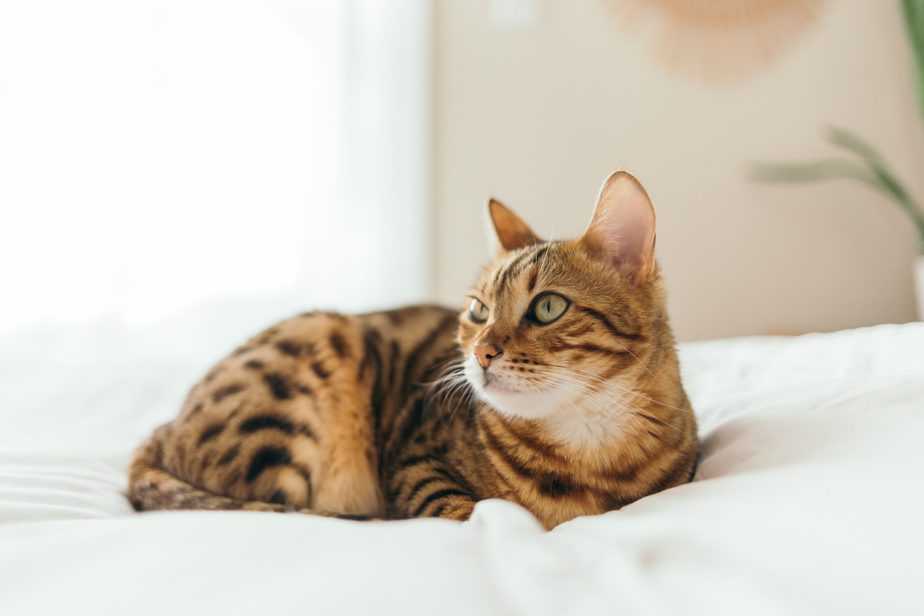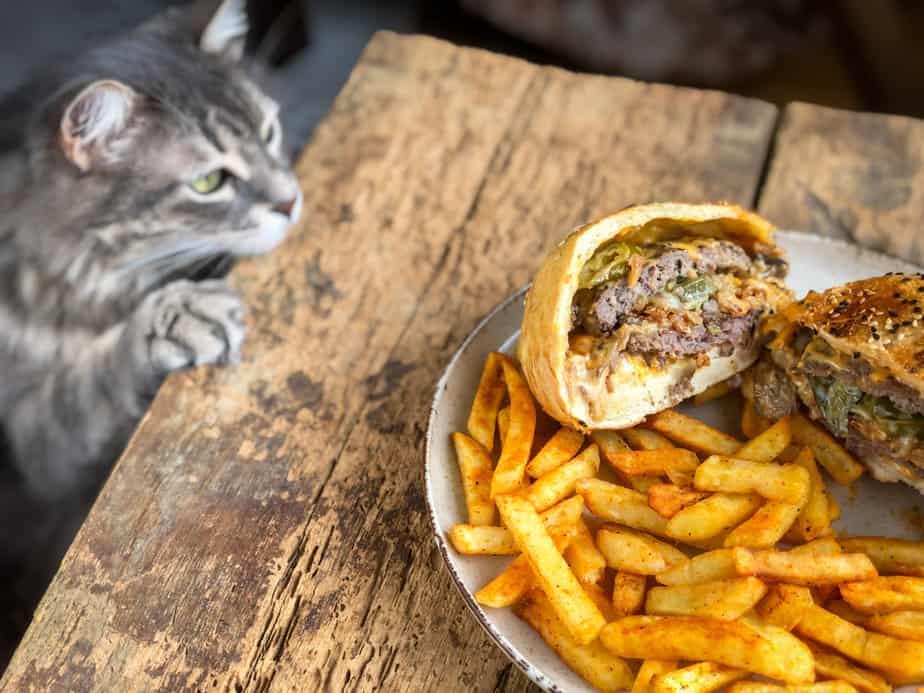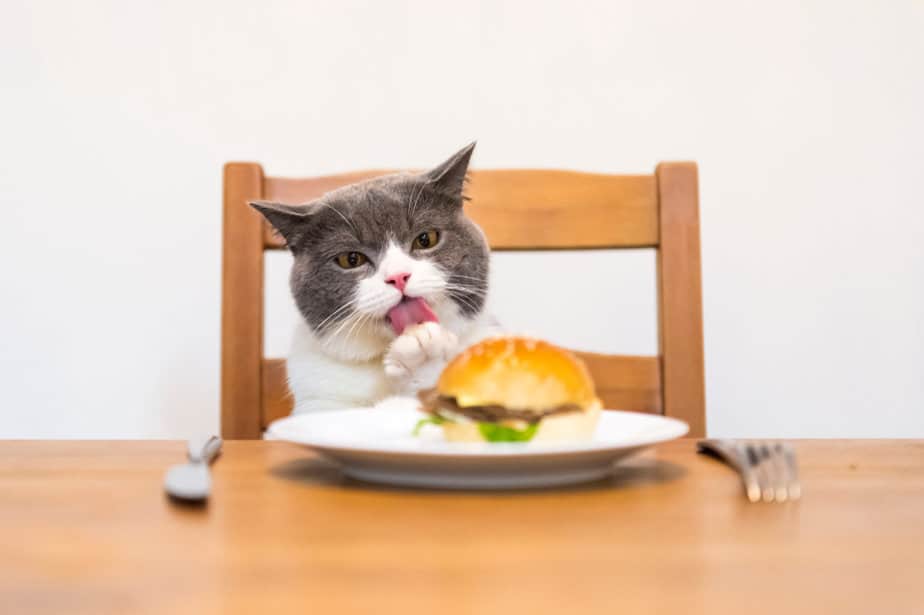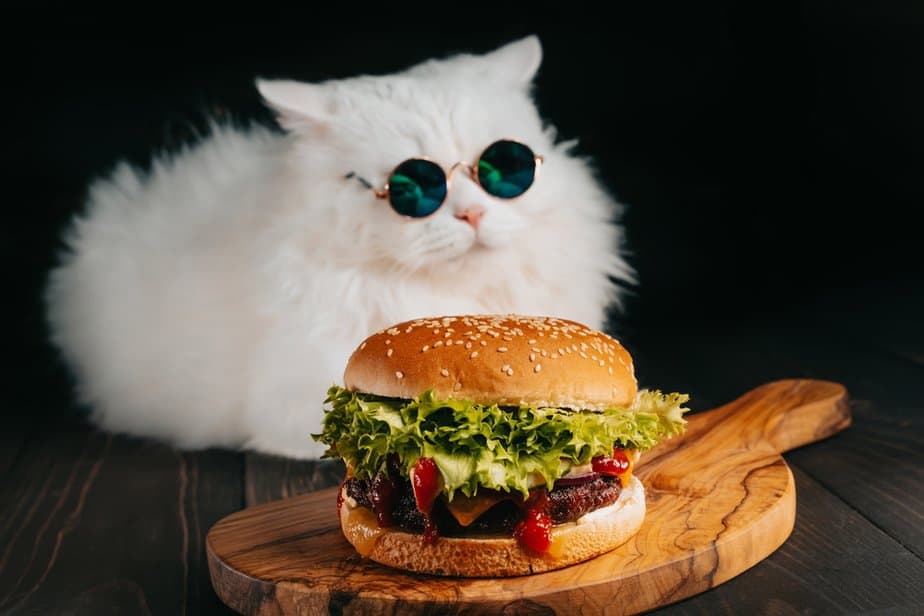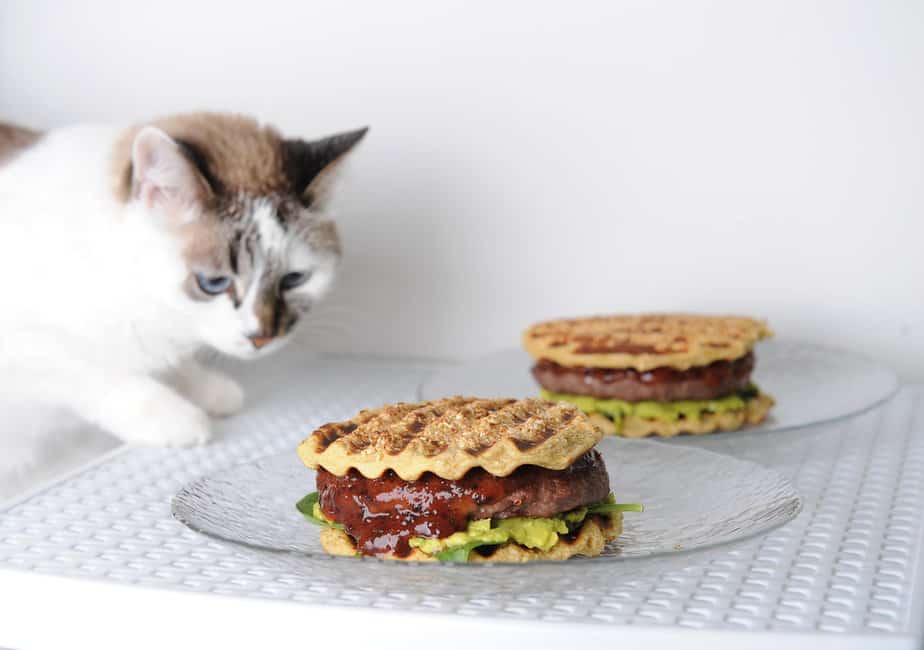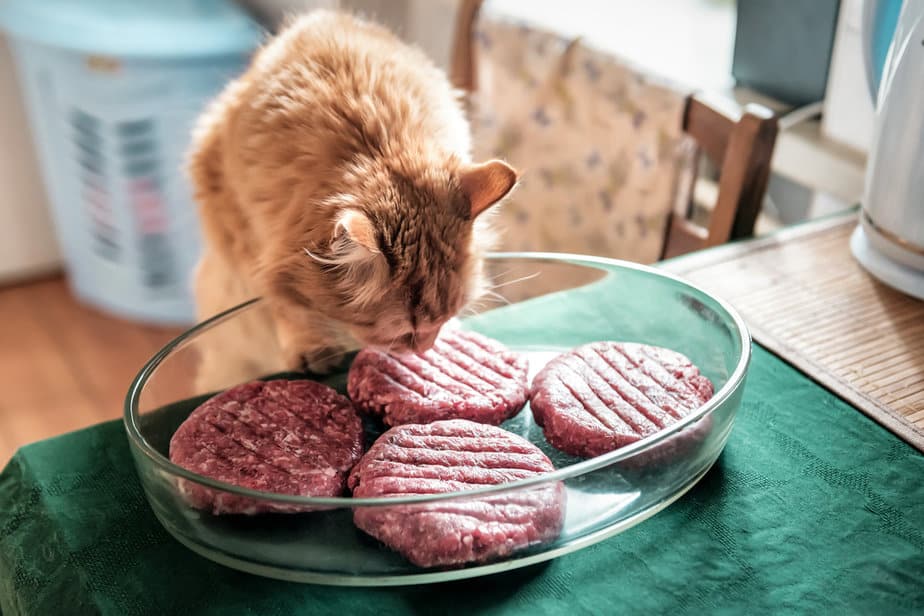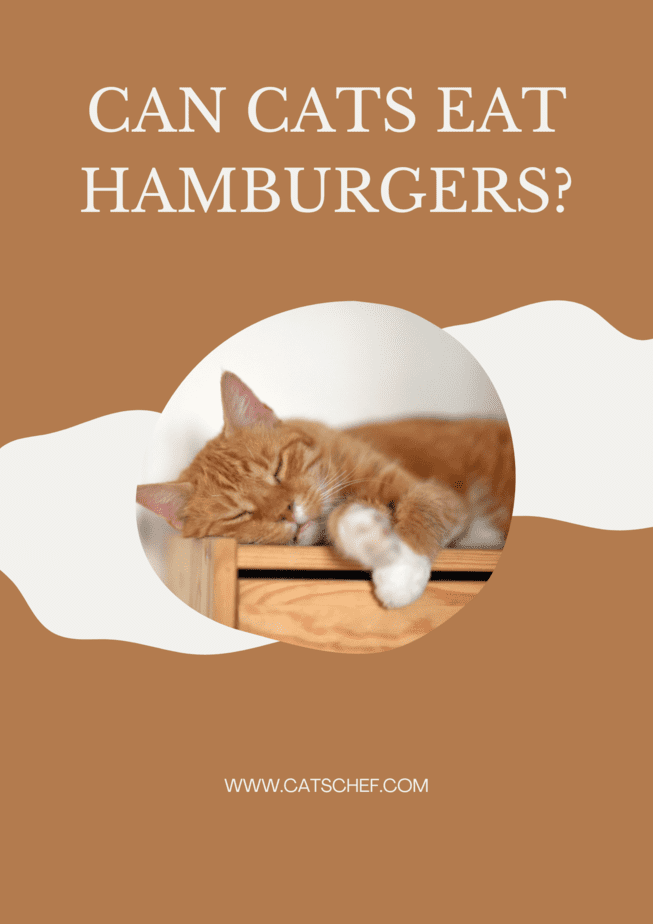📖 Table of Content:
Summer’s approaching and you know what that means – BBQ nights, mouth-watering hamburgers, and your four-legged friend meowing and begging to let her have a taste. Argh, can cats eat hamburgers!?
Let’s be honest, this isn’t the first time your curious creature has shown more interest in table scraps than her regular cat food and cat kibble. You’re well aware that cats can get pretty picky with what goes into their mouths, but seriously!?
Your precious purrincess wants a hamburger!? And now it’s your responsibility to be a good pet parent and tell her no? That’s probably the last thing you want to do because you don’t want to see her pouty snout scrunch up and utter the saddest meow you’ve ever heard.
Don’t worry, you did right when you decided to look up “can cats eat hamburgers” and check whether there’s a way out of this situation. According to our friends over at the ASPCA, hamburgers aren’t the worst thing that can end up in your cat’s tummy.
But – there’s always a but when it comes to feeding your cat human foods or pretty much any foods that aren’t supposed to be a regular part of your cat’s diet. Can you imagine a hamburger running in the field trying not to get devoured by your cat? Of course not!
What we’re trying to illustrate here is that there are certain reasons you should be careful when deciding whether you should include hamburgers on your four-legged friend’s menu. The cat lover within you wants to say yes to everything she asks, but this one might require a no.
But cats are meat munchers, not so?
Let’s start at the very beginning, shall we? We can’t discuss your “can cats eat hamburgers” dilemma without mentioning that cats are obligate carnivores. That means that they require meat, animal protein, and animal-sourced nutrients to survive and thrive.
Your precious purrincess would be in the field chasing down that hamburger if she wasn’t on the sofa waiting for you to give her a tasty treat because she’s being adorable. We’re obviously joking about the hamburger thing, but everything else is pretty on point.
Your four-legged friend isn’t likely to get most of her nutrients from the wild. But, she’s certainly likely to get them from carefully crafted cat food.
Such cat food includes veggies (carrots, peas) and fruits (blueberries) that provide her with vitamins, minerals, and antioxidants. On the meat side of things, most commercially available cat food includes chicken, turkey, or beef, which provides her with protein. It also typically contains fish (for the amino acids) and nuts (for the fatty acids).
All these nutrients play an essential role in your cat’s health. But, the most important part of a cat’s diet is meat.
Whether we’re talking about wild cats or domesticated cats, our four-legged friends require meat in their diets. But surely that also means that cats can eat hamburgers without any repercussions? Or, can they!?
So, can cats eat hamburgers?
There’s no reason to panic if your curious creature took a bite of your hamburger while you weren’t looking. Technically speaking, cats can eat hamburgers, as long as they’re properly cooked and don’t contain any harmful ingredients. That doesn’t sound like much of a yes, now does it!?
We can’t answer whether cats can eat hamburgers without first establishing what’s in a hamburger. We already know that cats can eat beef because they’re carnivores and that’s what’s in their nature. But, what about everything else?
By definition, hamburgers consist of a hamburger bun, a ground beef patty, a couple of veggies like tomatoes, cucumbers, and lettuce, and a selection of sauces or condiments like ketchup and mustard. Nothing sounds too alarming, but don’t put on your celebratory hats just yet!
First things first, there’s no reason a hamburger bun shouldn’t get a passing grade! Carbohydrates aren’t going to be nice to your cat’s digestive system. But, a couple of bites of a plain, white hamburger bun shouldn’t cause too many digestive problems.
On the other hand, hamburger meat should be up for discussion because it does typically contain a bunch of harmful ingredients. It’s made out of ground beef, preservatives, and seasonings such as onion powder, garlic powder, and salt.
Ground beef itself is completely safe for your four-legged friend – it’s a good source of protein, and it’s delicious. But, you’ll want to skip out on all the other ingredients if you’re planning on sharing your Sunday BBQ with your cat.
Last but not least, most hamburger-friendly veggies are safe for cats. Your cat shouldn’t experience any adverse reactions from tomatoes, cucumbers, or lettuce. But, same as with seasonings, you’ll want to skip out on those sauces and condiments. Too much information!?
What’s so great about hamburgers?
You might be getting some mixed signals regarding whether cats can and should eat hamburgers. That’s completely normal considering that hamburgers contain a bunch of ingredients that might not be the best choice for your four-legged friend.
But, that doesn’t mean that she can’t enjoy your Sunday BBQ. She doesn’t need table scraps, hamburger buns, or pet food that’s been purchased and prepared with her in mind. She just needs a small bite of your ground beef patty to feel included, loved, and taken care of.
Can cats eat ground beef? Luckily for her, they absolutely can! Ground beef happens to be a great source of protein, minerals, and vitamins that are essential for the health of her bones, muscles, skin, and coat. So, let’s take a closer look together!
1. Protein
Your furry friend requires heaps of protein in her diet. While humans (and some other animals) turn carbohydrates into energy, your cat does the same thing with protein. Not only does she use protein as an energy source, but she also uses it to build muscle and maintain a healthy body.
Not many people know this, but cats can develop protein deficiency when they don’t consume enough meat and other animal protein sources. The most common symptoms of protein deficiency are weight loss, muscle loss, and chronic shedding.
But, hamburger meat happens to be a great source of protein since it’s made of ground beef. Your furry friend might be pleased to learn that 100 grams of ground beef contain around 14 grams of protein.
That’s pretty great considering that a hamburger patty typically contains around 200 grams. So, next time you’re at a McDonald’s drive-thru, you might want to order an extra Big Mac for your furry friend.
2. Minerals and vitamins
You don’t even have to wonder whether cats can eat hamburgers when you take a look at the list of minerals and vitamins this tasty treat brings to the table. Most pet parents don’t picture a hamburger when they’re thinking about healthy foods to feed to their cat, but…
A hamburger patty doesn’t come without heaps of iron, niacin, selenium, zinc, and vitamin B12. And that’s just the patty! Tomatoes are packed with vitamin C, vitamin K, and potassium. Cucumbers are rich in vitamin B, copper, and magnesium.
And let’s be honest, your cat needs all these nutrients so she can run around your apartment and cause trouble. How else would she have enough energy to spend the day meowing and demanding for you to feed her, pet her, and leave her alone!?
3. Your cat’s adorable smile
“Why does my cat love hamburgers so much!?” Because she knows exactly how amazing they can be when her parents make sure they’re properly cooked.
You can’t argue that hamburgers contain certain ingredients that aren’t the best choice for your four-legged friend’s diet. Too many carbohydrates might be tough on her tummy and cause her all sorts of digestive issues. They might even lead to weight gain and obesity.
On the other hand, too many artificial colorings, preservatives, and seasonings might cause different sorts of health problems in the long run. Let’s be honest, a McDonald’s Big Mac isn’t even recommended for human consumption.
But, there’s hardly anything better than putting a smile on your cat’s face. Chances are your cat will perk up those whiskers the minute you bring out those Sunday BBQ hamburgers. How can you say no to that adorable face?
Luckily for you, you don’t have to! Cats can eat hamburgers as long as you cook them properly and remove any ingredients you don’t want your cat to consume. There are so many ways in which you can do that, and we’re here to help you.
Can cats eat raw hamburgers?
Continuing with the whole “cats are obligate carnivores” argument, you might assume that cats can eat raw beef with no repercussions. While it’s possible for certain cats to eat raw meat as a part of their regular diet, that’s simply not the case for the majority of others.
Why is that? Well, raw meat often contains parasites and bacteria such as salmonella and E. coli that can lead to food poisoning. Typical symptoms of food poisoning include stomach upset, vomiting, and diarrhea, which certainly doesn’t sound like something you want your cat to experience.
Cooking your hamburgers properly ensures your own safety, as well as the safety of your furkid. Additionally, cooking your hamburgers enables you to control which ingredients go into your patties and which don’t.
Can cats eat “beyond meat” hamburgers?
Wait, what!? If you aren’t familiar with the term “beyond meat,” buckle up because you’re in for a treat. Beyond meat hamburgers aren’t made of ground beef. They’re made of numerous plant-based ingredients and seasonings, and shaped to appear like the real deal.
They’re often seen as an excellent choice for vegans and vegetarians of the world, but are they the right choice for your meat muncher? Can cats eat beyond meat hamburgers?
We have a feeling your four-legged friend won’t be too gutted to hear this, but… Cats can’t eat beyond meat hamburgers. Cats are carnivores, they require meat, animal protein, and animal-sourced nutrients in their diets. And, they also might experience adverse reactions from some of the ingredients.
Cats can eat hamburgers, but…
There’s always a but when it comes to feeding your four-legged friend with anything that isn’t supposed to be a regular part of her diet. She can have a hamburger as an occasional treat, but she should get most of her nutrients from carefully crafted cat food.
Other than that, it’s always a good idea to consult with your vet before making any significant changes to your cat’s diet. As they say, it’s better to be safe than sorry!
